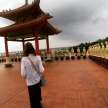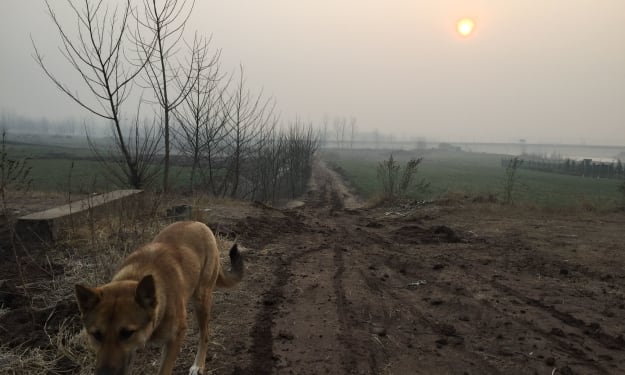The Secrets of Five Sister Beaches
Winter in Central Coast, Australia

The daylight is waxing again here—we've crossed over the Solstice and winter has officially begun, but spring feels already on the way, with warm, sunny days and that fresh, lush, greenery smell in the air.
And already I find my favorite thing about this time of year is the way the light falls on the grass: strong but at that strange angle, casting long shadows and lighting everything from within. The sun is low and in the North. The moon is waxing and her craters are strangely placed. But spring feels familiar and old, presided over by stars and winds in just as ancient a fashion as in the North.
I traced and retraced my paths of exploration here, until the story that this winter wove for me constellated around five beaches:
The Entrance, where Lake Tuggerah opens up and meets the ocean. The algae and seaweed glow verdant as the sunlight hits the water along the edge of the stone walkway. Baby prawns clear like glass dart among the seaweed, their eyes white. If you go down there at night with a torch, their eyes will reflect in the beam of light. Stingrays hide among the shadows sometimes, their pectoral fins fluttering. Pelicans collect on a small island and sometimes fly in, staring quizzically at passersby. Pop-up shops sell crystals on Saturdays. Down farther, an abandoned boat shop, a dusty closed restaurant. Hidden around a cliffside, a memorial ground the size of a small garden, with clean white crosses and carved messages.
Bateau Bay, not as built up as the Entrance, and not as beaten down. A long stretch of beach protected by grassy dunes. When we first started going to this beach, C was still injured from our time training in China, and so limped carefully down the long staircase path to the water. Stinging jellyfish, Blue Bottles, were washed up all over the shore. We walked along the low, soaked rocks where water was slowly creeping in with the tide. In the crevices, crabs hid with massive claws and bright bulbous eyes. I found a gold ring on that beach, I felt like a pirate finding treasure—it felt lucky, truly lucky, like a sign of things to come.
Shelly Beach, surrounded by forests and flooded with winter storms. One large, white house braved the shoreline, with a coffee shop that would close the moment it rained. The beach was well-peopled near the shop, but quickly quieted once you reached the water. Farther up, there were cliffs excellent for whale-watching. In the evening, a lighthouse in the distance offered its solemn beacon. Here, at this beach, there was enough cheer to lift heavy circumstances. And as the days grew shorter, it was here that we found ourselves brave enough to open up about our regrets and frustrations from the past year, and our fears about the future. By the time we started visiting this beach, C’s limp was nearly unnoticeable, and I wasn’t getting so nauseous and dizzy from walking. We had no money, no jobs, few leads, but things were getting better, and the dogs running on the beach chasing seagulls became a symbol of that.
Then, when we got our own place, and leads turned into jobs, we found the Marina Parade, where we started skimming rocks, our small reclamation of our bodies and our health. A good skimmed stone requires that the whole body twist from the hips, and will leave an ache the next day. We marveled at the tricks we could do around the varying waves and tidepools. This beach was little known, little touched. I came out here once at sunrise, after a sleepless night—the water was the most brilliant jewel-blue—but the rising sun was so dazzling, I could not look for long.
Yesterday, having grappled long and hard with our budget, we were walking and arrived at this bench. My dreams had been plagued the night before with a Spanish cathedral to which I had long hoped to make a pilgrimage. The white of that painted bench reminded me of the dusty white of the scallop shell that is that pilgrimage’s symbol. I mentioned it to C, even though it made no sense in our future plans—even though we didn’t have enough money to pay our rent next month. But he was struck, and we started spitballing ideas on how we could possibly make that dream happen. Determined, but without a realistic plan, we kept it in our minds, a clear vision—at home an hour later, we got a phone call: the hospital debt that was inhibiting us had been cancelled. We looked at each other, our silence full, the phone between us.
Budgewoi: the name means “beach,” and even among all the beaches North and South, this is the one the aboriginals called such. The night that C took me here, I’ll never forget. It was my first night in Australia. We had gotten fish n’ chips at a place on the river and sat on the dock under the bridge, feeding an angry posse of seagulls who squawked and swooped to our delight. With our injuries, it seemed absurd at first to enjoy something so trivial. It was a lengthy process, feeding all those fries to the screaming swarm, but I couldn’t help but laugh at their dive-bombs into the water, their puffy shows of dominance. As the light died, we made our way to a path through bushland, massive gum trees hung with lichen, shadowing swirling vines the size of spinning wheels in the undergrowth. The path opened up to Budgewoi beach, an endless stretch of secluded shoreline curving off gently in the distance. The wind was savage that evening and whipped the sand up so hard that our legs burned with the sting. As the last of the light died, we sought refuge from the wind back in the bush. And stepping out into the open on the other side, a colony of massive fruit bats, called flying foxes, was heading north for their evening migration and hunting. We watched them, swooping and diving—the soft clatter of their wings mingling with the howling of the wind. It was endless, their traversing—the colony was huge.
In mythology, the bat signifies the ending of a chapter. The bat is the master of the subtle underlying forces that cause some things to prosper and others to fade. What was prospering, and what was fading? Having just come back from one of the most challenging years of our lives, we did not yet know. We were still reeling.
But, while the chapter ends, the story continues.
About the Creator
Luna Jennifer Cross
Writer, Traveler, Martial Artist, Dreamer.







Comments
There are no comments for this story
Be the first to respond and start the conversation.